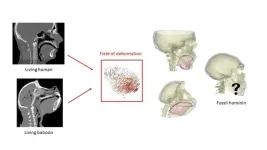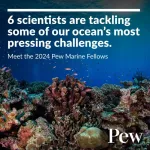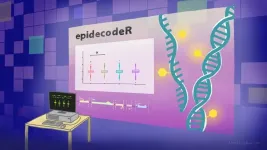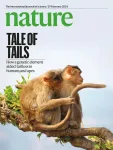(Press-News.org) New method enables 3D tongue modelling, for example from fossilized hominin skulls, and might help understand the emergence of human speech.
####
Article URL: https://journals.plos.org/ploscompbiol/article?id=10.1371/journal.pcbi.1011808
Article Title: Predicting primate tongue morphology based on geometrical skull matching. A first step towards an application on fossil hominins
Author Countries: France
Funding: This work is a production of the members of the team "Origins of speech" hosted at Sorbonne University - Institut des Sciences du Calcul et des Données. The funders had no role in study design, data collection and analysis, decision to publish, or preparation of the manuscript.
END
New method enables 3D tongue modelling, for example from fossilized hominin skulls, and might help understand the emergence of human speech
2024-02-28
ELSE PRESS RELEASES FROM THIS DATE:
Pew names scientists from 6 countries as 2024 fellows in marine conservation
2024-02-28
PHILADELPHIA—The Pew Charitable Trusts announced today that it has selected six distinguished researchers as recipients of the 2024 Pew fellowship in marine conservation. The researchers—from Canada, China, Denmark, the Philippines, the United Kingdom, and the United States—join a community of more than 200 Pew marine fellows who have undertaken projects to deepen our understanding of the ocean and advance the sustainable use of marine resources.
“The world’s oceans have never been under greater threat. Humankind relies on healthy oceans in countless ways,” said Susan K. Urahn, Pew’s ...
For Type II diabetes prevention, tap into AI
2024-02-28
AUSTIN, Texas — Better prevention of Type II diabetes could save both lives and money. The U.S. spends over $730 billion a year — nearly a third of all health care spending — on treating preventable diseases like diabetes.
For the 98 million adults who are prediabetic and at risk of developing Type II diabetes, preventive treatments such as the drug metformin can help stave off the disease. But the medicines are expensive. With limited budgets, insurers and health care facilities need to allocate them to the patients they can help the most.
Currently, a health ...
New tool helps decipher gene behaviour
2024-02-28
Scientists have extensively researched the structure and sequence of genetic material and its interactions with proteins in the hope of understanding how our genetics and environment interact in diseases. This research has partly focused on ‘epigenetic marks’, which are chemical modifications to DNA, RNA, and the associated proteins (known as histones).
Epigenetic marks influence when and how genes get switched on or off. They can also instruct cells about how to interpret and use genetic information, influencing various cellular processes. Changes in epigenetic marks therefore significantly impact gene regulation and cellular ...
Think smoking cannabis won’t damage your heart? Think again
2024-02-28
The cardiac risks of smoking marijuana are comparable to those of smoking tobacco, according to researchers at UC San Francisco, who warn that the increasing use of cannabis across the country could lead to growing heart health problems.
The study found that people who used cannabis daily had a 25% increased risk of heart attack and a 42% increased risk of stroke compared to non-users.
Cannabis has become more popular with legalization. Recreational use is now permitted in 24 states, and as of 2019, nearly 4% said they used it daily and 18% used it annually. That is a significant increase since 2002, when 1.3% said they used it daily and 10.4% ...
Early-life exposure to air pollution and childhood asthma cumulative incidence
2024-02-28
About The Study: In this study of 5,279 children, early life air pollution was associated with increased asthma incidence by early and middle childhood, with higher risk among minoritized families living in urban communities characterized by fewer opportunities and resources and multiple environmental co-exposures. Reducing asthma risk in the U.S. requires air pollution regulation and reduction combined with greater environmental, educational, and health equity at the community level.
Authors: Antonella Zanobetti, Ph.D., ...
Hourly heat exposure and acute ischemic stroke
2024-02-28
About The Study: The results of this study of 82,000 patients with acute ischemic stroke suggest that hourly heat exposure is associated with increased risk of acute ischemic stroke onset. This finding may benefit the formulation of public health strategies to reduce cerebrovascular risk associated with high ambient temperature under global warming.
Authors: Jing Zhao, Ph.D., and Haidong Kan, Ph.D., of Fudan University in Shanghai, China, are the corresponding authors.
To access the embargoed study: Visit our For The Media website at this link https://media.jamanetwork.com/
(doi:10.1001/jamanetworkopen.2024.0627)
Editor’s ...
CityUHK develops world-leading microwave photonics chip for high-speed signal processing
2024-02-28
A research team led by Professor Wang Cheng from the Department of Electrical Engineering (EE) at City University of Hong Kong (CityUHK) has developed a world-leading microwave photonic chip that is capable of performing ultrafast analog electronic signal processing and computation using optics.
The chip, which is 1,000 times faster and consumes less energy than a traditional electronic processor, has a wide range of applications, covering 5/6G wireless communication systems, high-resolution radar systems, artificial intelligence, computer vision, and image/video processing.
The team's research findings were published in the prestigious scientific ...
The “switch” that keeps the immune system from attacking the body
2024-02-28
A microscopic battle rages in our bodies, as our cells constantly fend off invaders through our immune system, a complex system of cells and proteins designed to protect us from harmful pathogens. One of its central components is the enzyme cyclic GMP-AMP synthase (cGAS), which acts as a sentinel, detecting foreign DNA and initiating an immune response.
However, the immune system requires precise regulation to prevent cGAS from mistakenly attacking the body's own tissues, leading to autoimmune disorders, which now affect about 10% of the global population.
Previous studies have revealed a little of how this ...
Study unravels the earliest cellular genesis of lung adenocarcinoma
2024-02-28
HOUSTON ― Researchers at The University of Texas MD Anderson Cancer Center built a new atlas of lung cells, uncovering new cellular pathways and precursors in the development of lung adenocarcinoma, the most common type of lung cancer. These findings, published today in Nature, open the door for development of new strategies to detect or intercept the disease in its earliest stages.
Led by Humam Kadara, Ph.D., professor of Translational Molecular Pathology and Linghua Wang, M.D., Ph.D., associate professor of Genomic Medicine, the team generated an atlas of around 250,000 normal and cancerous ...
Change in gene code may explain how human ancestors lost tails
2024-02-28
A genetic change in our ancient ancestors may partly explain why humans don’t have tails like monkeys, finds a new study led by researchers at NYU Grossman School of Medicine.
Published online February 28 as the cover story of the journal Nature, the work compared the DNA of tail-less apes and humans to that of tailed monkeys, and found an insertion of DNA shared by apes and humans, but missing in monkeys. When the research team engineered a series of mice to examine whether the insertion, in a gene called TBXT, affected their tails, they found a variety of tail effects, including some mice born without tails. ...







